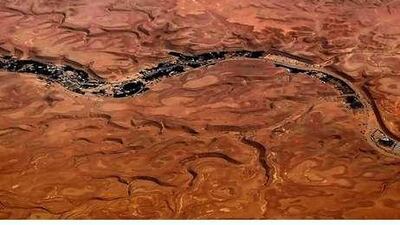Saudi Aramco's announcement this week it has discovered alternative sources of natural gas that will be expensive to extract underscores a broader shift in the industry that will significantly increase costs for regional governments. Saudi Arabia, Kuwait and the UAE are weighing the development of costly "unconventional" sources of gas tightly trapped in bedrock or contaminated with toxic substances that make extraction more problematic. Oman and Jordan, which have almost no oil and gas reserves, have already enlisted international help in harvesting difficult "tight" gas.
Khalid al Falih, the chief executive of Saudi Aramco, the state oil company, raised eyebrows this week when he said the firm had identified significant reserves of unconventional gas. It marks a departure for a company that has relied for years on producing gas cheaply as a by-product from oil output to meet the country's energy needs. "Our future gas exploration programmes target growing those reserves from deep offshore, sour gas, shale gas and tight gas reservoirs in addition to conventional onshore gas," Mr al Falih told the World Energy Council Congress in Montreal on Monday.
The unconventional reserves - including shale gas - could amount to hundreds of trillions of cubic feet, adding significantly to proven reserves of 280 trillion cu ft that are already the sixth-largest in the world, Mr al Falih told the Financial Times on the conference sidelines. Mr al Falih's mention of shale gascaught the attention of analysts across the world. Gas buried in shale rock was traditionally considered too difficult and costly to be worth developing, but new technology and drilling techniques have led to development of huge shale fields in the US. Oil companies have been scrambling to identify other parts of the world that may hold similar reserves, including in Europe and China.
Almost no shale exploration efforts have been undertaken in the Middle East, analysts said. "It just has not been on the agenda," said Samuel Ciszuk, a Middle East energy analyst at IHS Global Insight in London. "There's no real substantial talk about Middle East and North African shale gas, as far as I'm aware." The Society of Petroleum Engineers has said the whole of the MENA region could hold 2,547 trillion cubic feet of shale gas, about two thirds of North America's total. But the number is a rough estimate based on geological trends across the world, said a Middle East energy analyst based in Europe, who wished to remain anonymous.
"There's not a lot known about unconventional gas in the Middle East," he said. "The reason is that national governments haven't looked hard as they often have a lot of associated gas that has been available." That is now changing, as Mr al Falih's comments made clear. Saudi Arabia is short of gas and instead burns significant quantities of crude oil in its power stations to meet surging demand. The Saudi government has made clear it would prefer to burn gas, even if extraction costs increase substantially, Mr Ciszuk said.
"I think, for a long-term strategy, they would definitely want to go for shale gas - if indeed available - rather than burning liquids," he said. "Burning liquids is seen as a necessary evil these days. With domestic demand rising as fast as it does, I think they will look to all kinds of future gas opportunities available to them." Other countries have followed suit, although exploiting unconventional fields in the region is five times costlier than tapping conventional fields, according to a June estimate by the International Energy Agency, based in Paris.
The Abu Dhabi National Oil Company is developing the Shah gas field in the southern part of the emirate. That project will require US$10 billion (Dh36.72bn) in investment to strip the gas of poisonous hydrogen sulphide. Kuwait last year enlisted Royal Dutch Shell to explore the development of similar fields that are extraordinarily deep and filled with toxic gas. Jordan last year picked BP to explore and develop the Risha unconventional gas field in the country's far eastern region. The tight gas is locked in fine-grained sandstone and will require significant investment to start production.
cstanton@thenational.ae

